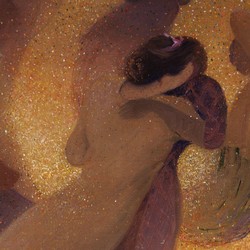
It is quite common that the poetic voice in love songs is addressed to a lover who is far away; literally, for example, in Beethoven's cycle An die ferne Geliebte. When lovers need a messenger to convey words and feelings, Romantic poetry gives it the form of an element of nature that covers the distance between them. Sometimes it's a bird or some other flying creature (a bee or a butterfly, for instance); sometimes, clouds; sometimes, a brook, and sometimes, as we will see in this article, the wind.
When the wind is the messenger, it is also quite common that the poem is a version of or inspired by an Arabic or Persian poem: in these cultures, the soft east wind is the bearer of joy and hope, while the west wind brings uncertainty and unrest to the hearts. A while ago we heard (and I spoke about if very briefly because I was about to leave on holiday) a song that follows this scheme, one of Schubert's best known, Suleika I. The poem, included in Goethe's West–Eastern Diwan (although he's not the author), explicitly mentions the east wind; Suleika is grateful for the good news it brings her and encourages it to pass on to serve friends and sad people.
In our song this week, Botschaft [Message] by Johannes Brahms, we don't hear the voice of the recipient but the voice of the sender of the message. The poetic voice asks the wind for caring for the loved one, for playing with her locks, for remaining with her for a while. He also asks it for telling her his love. The poem doesn't specify which wind is the bearer, but it should be the east wind, because Georg Friedrich Daumer's poem is a version of a poem by the Persian poet Hafis. Daumer had spent the 1940s studying Persian mysticism and Islam, and this interest led him to publish, in 1847 and 1852, two volumes of versions of poems by Hafis, of which Brahms musicalized Botschaft and a few more.
The composer met Daumer's poetry in 1863, after the poet had stopped publishing; his study of religions and his advanced ideas came into conflict with the law and by the mid-1950s he retired to live discreetly, almost as a hermit. Brahms was enthusiastic about his poetry, and in the following years he devoted himself intensely to it, defending it against the friends who didn't understand that Daumer's poems were his favourite.
Botschaft, Op. 47/1 is one of the gems that emerged from this enthusiasm (and I specify the catalogue number to avoid confusion, because there is another Brahms' Lied with the same title in his Liebeslieder-Walzer). It's an elaborate piece that basically owes his charm to the accompaniment. I find the prelude irresistible; I imagine a flying leaf, driven by the breeze that we find in the first verse of the poem, a playful atmosphere that remains the whole song. This music is delightful, but it may also become a trap for the pianist if at some point he forgets the score's "grazioso" and "piano leggiero" indications; in Graham Johnson's words, the accompaniment could sound "like a cavalry charge", an image that spoils any other that the text would suggest.
Brahms divided the twelve verses of the poem into three musical stanzas. The first one, the first four verses, tells us of the wind that plays with the beloved; the request of not hasting to leave her is repeated. The second stanza has only two verses; the poet expects her to ask for him, and his melody becomes more serious. But when we hear the message that the wind should carry, the last five verses, the first verse's melody comes back, this time ending triumphantly with the repetition of the last verse.
Some time ago we talked about Schubert's Lob der Tränen and "old-fashioned" song; it was a favourite during the 19th century, but times change and nowadays is hardly heard. I would say this is also the case of Botschaft, just pay attention to the available recordings: most of the singers left the stage many years ago. There are just some recordings made for present singers (some of them really beautiful) and I think that's a pity, because this song might sound amazing in a recital. So I would appeal to singers to add Botschaft to their repertoire. Pianists, I know you would never turn this gorgeous song into a cavalry charge, please encourage your singers!
Who knows, with any luck, maybe someone will put the score on the stand. At the moment, we'll listen to Botschaft performed by a duo "in the old times": tenor Ernst Haefliger and pianist Herta Klust. As said, a gorgeous song.
Wehe, Lüftchen, lind und lieblich
Um die Wange der Geliebten,
Spiele zart in ihrer Locke,
Eile nicht hinwegzufliehn!
Tut sie dann vielleicht die Frage,
Wie es um mich Armen stehe;
Sprich: »Unendlich war sein Wehe,
Höchst bedenklich seine Lage;
Aber jetzo kann er hoffen,
Wieder herrlich aufzuleben,
Denn du, Holde, denkst an ihn.«
Blow, Breeze, gently and lovingly
about the cheeks of my beloved;
play tenderly in her locks,
do not hasten to flee far away !
If perhaps she is then to ask,
how it stands with poor wretched me,
tell her: "Unending was his woe,
highly dubious was his condition;
However, now he can hope
magnificently to come to life again.
For you, lovely one, are thinking of him!"
(translation by Emily Ezust)


 One of...
One of... The songs of...
The songs of...










